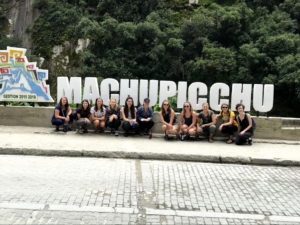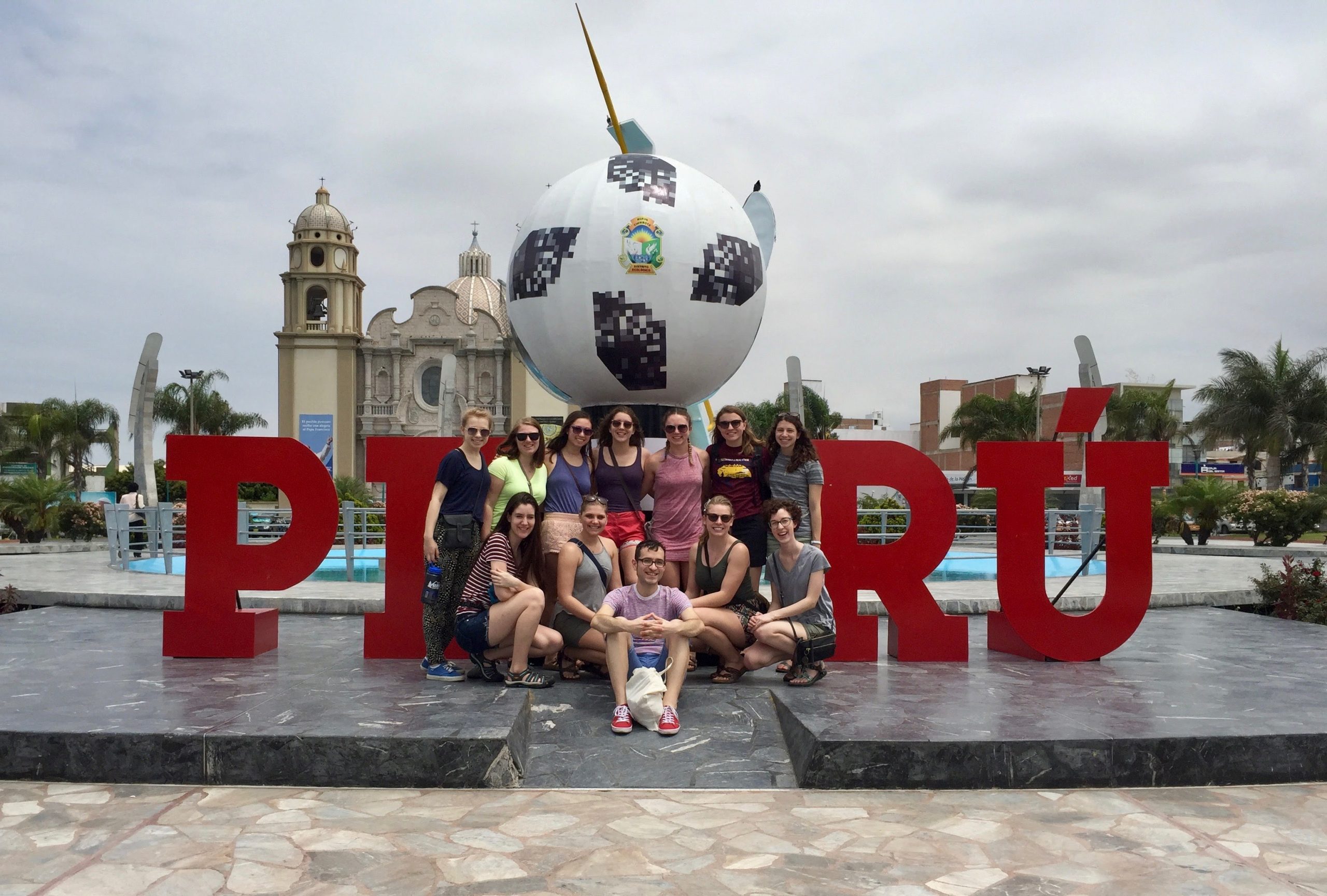It is every college student’s dream to go abroad, but very rarely does it come to be that our deepest hopes ever come to fruition. As us eleven Gustie girls sat on our third rumbly bus of the day, weaving through the streets of Chimbote, Peru, we sat in awe as the weightiness of these final moments before our official arrival at our host parish, Our Lady of Perpetual Help.
Partnering with Asociación Civil Apoyo Familiar (ACAF), we had jumped on the opportunity to visit the South American country in order to teach English to community members in Chimbote, finishing up our travels with a sightseeing excursion to Machu Picchu.
Chimbote was vastly different than the Peruvian countryside. While many houses were clearly worn, they were brightly colored—a small defiance to the dirty living conditions to which many people are bound.
This was a stark improvement to the housing developments on the long drive. Communities stretched up mountains as the growing communities gasped for air, and the houses were made by tightly weaving together durable materials, such as special kinds of plastics or woods.
In Chimbote, the houses on the main roads were constructed in a more traditional sense, although we were oblivious at the time of the conditions that existed beyond.
After settling into the parish and finalizing our english lesson plans, it was time to meet our students. Our professor, Darío Sánchez-González, divided us into three groups named after iconic Peruvian animals: puma, serpent, and condor.
We took great joy when we would find these animals about Peru, taking lots of pictures when we found all three animals together—once even cut into the grass at the base of an old Incan temple.
Each team was given two assignments which consisted of both a younger and an older age group. As part of Team Condor, we would be teaching 8-10 year olds in the morning, and young adults in the afternoon, and also expected to have a smaller class size due to the fact our team was smaller than our other animalistic counterparts.
This was our first lesson as new teachers, and would set the precedent for the entire trip— never expect the expected.
Twenty seven children accumulated in our classroom over the course of our two weeks in comparison to the fifteen we expected.
Bright shiny faces, the kids came with notebooks and lunch boxes decorated with Disney characters, no different than any child in the U.S, although when I tried to sing songs from Moana or Tangled, they stared at me blankly. “What’s her name?” I asked a little girl, pointing at Rapunzel. “Barbie.”
She responded, pointing at her friend’s notebook which sported an equally as blonde and blue-eyed girl. To combat Barbie, many girls toted around goods which featured a Latina girl, the protagonist from Disney’s Soy Luna, although Luna still happened to have blue eyes and skin as light as mine.

Our adult class was fruitful as well, with longer attention spans to focus on verb-forms and vocab lists, but it was our children with whom we built the closest connections.
Team Condor grew particularly close to a group of cousins in our morning class after the youngest girl was burned on one of our first days teaching. Because the water in Peru is not potable, families are constantly boiling water for consumption so they don’t spend hard-earned soles on bottled water.
Thirsty, the little girl began to drink from the family thermos, not realizing the water within was still at a boiling temperature. Scalded, she dropped the thermos, propelling the water down her chin and chest.
Her mother, at one of the afternoon adult classes, was called quickly home. Education or child protection. She could not afford both. Burn victims are not uncommon because of the difficulty to obtain safe water.
Another student in our class came only two times because of the long commute to school, but her dedication to her schoolwork was amazing because of her difficulty writing.
At six years old, she fell into her family’s vat of boiling water, ruining her hands forever. Doctors sewed some of her toes onto what was left of her arms, granting her the ability to write and hold objects, even if painful.
While this particular girl lived far from the parish, we were able to connect with the other burn victim’s family, fortunate enough to even witness their home situation.
Delivering beds in the community one day, we were shocked as our lead social worker mentioned the names of the four cousins. Their house was next on our list. The brightly colored stable buildings we were accustomed to seeing on the main streets of Chimbote faded away, and we began to walk past houses that resembled the shoddily built shanties that stretched up the mountainside on our drive to Chimbote.
Our previous bed delivery had been heart-breaking. The father had died recently, and the sons, so close to graduation, were pulled from university, halting their education and forcing them to become street venders instead.
With a third crippled son and three younger children, the mother was grateful for the bed, but regretful she couldn’t move a pole which was hindering our movement in the household. Had she moved the pole, the entire house would have fell down.
It was hard to see, but this was harder. Knowing the little children who slept in the bed we carried out of the house made it so much worse. The mattress they had been sleeping on was almost non-existent, but instead, giant wet clumps of foam.
These four children were some of the hardest working in the class. They would ask for clarification on pronunciation, writing their own keys so they could practice at home in their own free time, and the little girls refused to let to boys take over the active games outside as they so often did.
We would play after school, and the games we had learned flowed from their bodies, and other little children would join, running their bodies through the motions of the Hokey Pokey, What-Time-Is-It-Mr.-Fox, Colors Colors.
Begging for the words we had learned, they relished in how tongue and teeth formed to create ‘my turn’, ‘play’, ‘girl’, ‘love’, ‘please’, ‘don’t’, ‘leave’.
Tunnels are a part of a sacred practice in both Spanish and Incan tradition. It takes trust of those around you, of a power above you, and a power inside you to make your way through the dark and enter the light on the other side.
Living in the U.S, we can leave the tunnel any time we want. Snatch a plane ticket, show the status of our citizenship, and we’re safe.
The people in Peru are still struggling for basic resources like good housing and clean drinking water, and personal empowerment as girls carry around backpacks decorated with standards of beauty determined by ethnicity.
These dark tunnels exist in all places, but we don’t have to travel abroad to help. One can learn more about A.C.A.F, a program kick started by Father Jack Davis, graduate of St. John’s University, at https://acafchimbote.com/.
